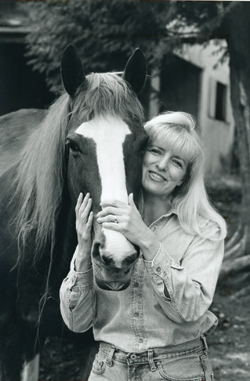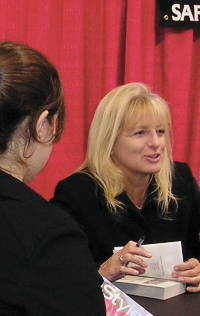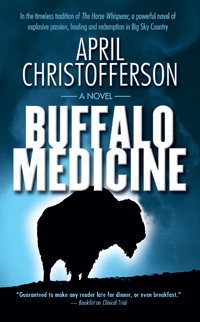April Christofferson with her "first and greatest 'horse love,' Sweetness, named after Walter Payton (of the Chicago Bears)."
Wielding A Mighty Pen
Novelist and U of U grad April Christofferson seeks to inspire readers to action even as she keeps them glued to their seats.
by Marcia C. Dibble
"I love the process of writing," says April Christofferson BS'73, "but I write because I'm trying to make a difference."
The issues around which Christofferson is now working to make a difference include the West's biggest areas of conflict—wildlife and public lands management, tribal rights, and development. Currently wrapping up her seventh novel, Christofferson has filled many a page in her efforts to educate as well as entertain, and she's found numerous willing readers along the way.
Growing up in Chicago, Christofferson came to love the West during summers visiting Yellowstone National Park and her grandfather's ranch in Wyoming, where both parents had been raised, and later her paternal grandparents' homes in Salt Lake City and Richmond, Utah. But the road she traveled to become a successful writer is a long and winding story in itself.
In many ways, it starts with Christofferson's maternal grandfather, Floyd "Doc" Carroll, a rodeo champion, movie stunt rider, and veterinarian who was inducted into the National Cowboy & Western Heritage Museum's Hall of Great Westerners in 1998.
"My Grandpa was such an influence," says Christofferson. "I knew from when I was a little girl that I was going to live out West and be a vet."
After receiving her undergraduate degree in biology from the U, Christofferson began a veterinary medicine program at the University of Illinois in Champaign. But after her first year, she realized she truly wanted to be back West and arranged to transfer to Washington State University, in Pullman. Then, during the course of making the move, she came to a second realization: She didn't really want to become a veterinarian.
"Throughout college, I worked at an animal hospital, but I was always upset—they would try not to tell me if someone was bringing in an animal to be euthanized, because I'd do anything I could to persuade them not to if treatment were at all possible," she says. "I realized I wasn't really emotionally cut out to be a vet."
In traveling to Pullman, Christofferson and her husband had driven through Coeur d'Alene, Idaho, and been deeply struck by the area's beauty. But, she recalls, "Pullman was not the West that I knew and thought I was returning to." So when she realized vet school wasn't where she wanted to be either, the couple quickly relocated to Coeur d'Alene, where April focused her love of animals on rescuing those in need and began a series of odd jobs: waitressing, loading UPS trucks, working as a pharmaceutical rep; while determining what else she could channel her passion into next.
I thought, I don't have a creative bone in my body. but I had just turned 40, so I sat down and wrote a scene about it—and I just got hooked that day.
After her oldest sister started law school, she began talking with April about how much she enjoyed it. "I knew our minds worked alike," Christofferson says, and she began to seriously consider the possibility of also giving law a try: Her son was about 2, which she thought was a good age to allow her to take on a new challenge, and Gonzaga University in Spokane would be an easy commute. Before long, she took the leap. "And I found that I loved it," she says.
Christofferson at a book signing during the annual Northwest Women's Show in Portland, Ore.
Shortly after receiving her law degree in 1983, Christofferson relocated to Seattle, where she began working as a contract attorney for music and video producer Miramar. "I loved the intellectual exercise and loved the company," she says. But after several years, she recalls, "I knew it wasn't the ultimate career for me. It just wasn't as fulfilling as I'd hoped for."
A photographer who was a close friend of Christofferson's and knew of her dissatisfaction began nudging her toward writing romance novels, telling her anecdotes about others who had made the transition from completely unrelated careers. "He called a few times and said, 'I just did a cover photo for a woman doctor who wrote a romance, and she's doing so well she just quit her practice.' Then he told me the same thing about a successful attorney," Christofferson remembers. "I thought, I don't have a creative bone in my body. But I had just turned 40, so I sat down and wrote a scene about it; and I just got hooked that day." Her life was already full—with her legal work at Miramar, two kids, and a houseful of animals—but, she says,"Once I started, I found I would always make time to write, it was so therapeutic and so much fun.
At the time, though, Christofferson had never read a romance novel. "So I finally read one, and thought, I can do this. But I'm so issue-oriented, I knew I'd have to write about issues I care about, which aren't necessarily very romantic." For her first book, After the Dance—set in the entertainment industry with which she was then intimately familiar—the underlying issue was that of a family dealing with the death of a son from AIDS.
After the novel's release by a small publisher in 1994, Christofferson swiftly got an agent and quit Miramar to write full time. Her second book, Edgewater, introduced more thriller elements into its essentially romantic structure, with a plot involving a heavily armed northern Idaho militia. She wrapped up that novel four years following After the Dance and promptly signed a book deal with national publisher Forge Books.
Just as she was finishing Edgewater, she was contacted about a short-term gig helping a biotechnology company with its contracts and other business agreements. "I had really just started writing full time, but I thought, Biotech would be such a great area to get experience in; it could provide such interesting background. So, I went to work for a few weeks—and found I was still there five years later." Working in that environment provided new fodder and depth for Christofferson's next three novels—The Protocol, Clinical Trial, and Patent to Kill— all medical thrillers favorably compared by reviewers to the work of Michael Crichton and Robin Cook. "I'm not a real fan of the pharmaceutical industry, so a big part of what I was trying to do was to expose some things that I was lucky enough to learn about because I was working in it," Christofferson says.
She centered the plots of the second and third of these thrillers around the abuse of indigenous peoples by unscrupulous westerners—a theme first introduced into her work in Edgewater. For her next book, she focused the action around another issue she had come to see as a reckless abuse of power, the slaughter of bison that wander outside the boundaries of Yellowstone National Park.
"Buffalo Medicine was the first book I had a Web site for, and I started getting e-mails—I got one just yesterday, three years after Buffalo Medicine was published, from a woman saying, "Thank you for letting me know this was happening, Buffalo Medicine is making a difference," and telling me she'd made a donation to the Buffalo Field Campaign, a nonprofit organization that works to protect the Yellowstone herds.
"In all my books, I try to come up with an exciting story that people will enjoy and care about, and use that to address issues that are really important to me and educate people about the issues, let them know what's happening. With Buffalo Medicine, I discovered that most people didn't know buffalo were being slaughtered, didn't know about the issue with brucellosis, a disease that can cause spontaneous abortions in bison and cattle.
The plot of the novel Christofferson is just finishing, Alpha Female, revolves around poaching (in this case, of wolves) and addresses the threat to national parks from drilling; she also now regularly writes nonfiction natural history pieces for Yellowstone Discovery, the Yellowstone Association's newsletter.
In addition to using her writing as a vehicle for educating readers, Christofferson devotes much of her time to working hands-on with nonprofits tackling the issues that most concern her. She serves on the board of the Montana Natural History Center and in 2007 helped start an organization called Footloose Montana, which is striving to educate the public about the dangers of trapping on public lands. She's also working with her son, a ranger at Yellowstone, in starting a nonprofit called Yellowstone Country Guardians.
Christofferson and her husband now alternate between homes in both Coeur d'Alene and Lolo, Montana (outside of Missoula, just off the Bitterroot River), and in January, she begins her fifth semester teaching screenwriting at the University of Montana-College of Technology, Missoula. "I fell in love with Missoula when my kids started going to school there; my daughter is actually still here," she notes. "The city is filled with so many committed, compassionate people, and incredibly environmentally aware people."
“I was a business attorney, but as a writer, I don't pay attention to the business end. I don't care about numbers other than that the numbers are the way to get the message out there.”
Her office in Lolo is in a small cabin overlooking a pond near the barn housing her two horses. "It's important to me to write by a window, and the view is amazing," she says. "My schedule is pretty full—serving on nonprofit boards, I'm in meetings a lot—so I try to write every day, but I usually don't succeed. So every once in awhile, I just have to try to sit down and get a couple good days in."
Christofferson has finished a screenplay based on Buffalo Medicine, and for a time was in talks about a film adaptation with producer Patrick Markey (The Horse Whisperer), but that project is on the back burner for now. In the meantime, she has written 100 pages of another proposal she and her agent came up with, and as she wrapped up Alpha Female, began bouncing around yet another idea. "I really like these characters, so I have talked with my editor about the possibility of a recurring series. I love writing about [national] parks, though I might only be able to go so far with Yellowstone," she says. "Buffalo Medicine was set more in ranch country, with scenes in Yellowstone, but Alpha Female is set in Yellowstone," she notes.
"I spend a huge amount of time in Yellowstone—I'm probably there every other week—so I've absorbed a lot there," says Christofferson. (Besides her avocational interest, visiting the park also affords Christofferson the opportunity to see her son and daughter-in-law, who works for the Yellowstone Association.) "For this book [Alpha Female], there's a law enforcement officer at Mammoth Hot Springs whom I bounce ideas off of. And after Buffalo Medicine, I got an e-mail from a retired Forest Service official living in Wyoming who said, "Keep writing about these western issues," and offered to help. So now I send him my manuscript as I'm writing, and he edits it for technical details. I always get great help from these wonderful sources."
"All my books are so important to me," she continues. "I care that they are successful mainly because I want people to know about these issues. I was a business attorney, but as a writer, I don't pay attention to the business end. I don't care about numbers other than that the numbers are the way to get the message out there."
In taking on these vital issues and powerful interests, Christofferson has become a mighty messenger indeed.
—Marcia C. Dibble is assistant editor of Continuum.
Return to Winter 2007 table of contents | Back to top




